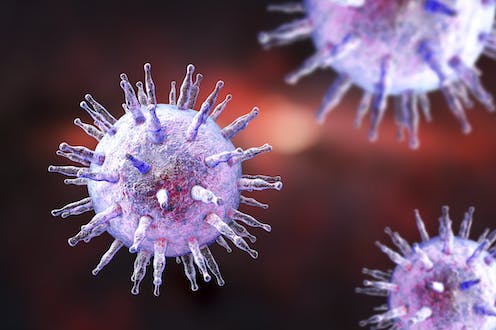
Kateryna Kon/Shutterstock
An estimated 2.8 million people around the world have multiple sclerosis (MS), an autoimmune disease in which the immune system damages the brain and spinal cord.
Symptoms include fatigue, vision disturbance, problems with mobility and balance and cognitive dysfunction. Many people who develop MS experience symptoms followed by a period of recovery, but over time the disease can progress to permanent disability.
The exact causes of MS are unknown. But for decades scientists have suggested a link between MS and Epstein-Barr virus (EBV). This is an infection which, when contracted in childhood, generally doesn’t cause symptoms. However, infection in adolescence can lead to glandular fever, also called the “kissing disease” or infectious mononucleosis (“mono”).
A 2022 study confirmed that people with MS have almost always been infected with EBV previously (generally the infection occurs several years before MS emerges).
But researchers are still debating exactly how this common virus could cause MS in certain people. Our new research offers some clues.
Table of Contents
A bit of background
When your body encounters an infection it generates an immune response so that next time you are exposed you will already have some protection from illness.
Normally, in healthy people, immune cells called T cells and B cells are generated against a single target such as one part of a virus or bacteria, and their job is to fight infection. B cells produce antibodies which bind to and destroy invading viruses or bacteria.
Autoimmune diseases – of which MS is one – occur when the body’s immune system damages itself by mistake. This can be caused by a phenomenon called molecular mimicry, which generally happens when immune cells, originally generated to fight infection, instead attack proteins in the body of a similar shape.
This causes a variety of symptoms and diseases depending on which part of the body the immune system is targeting. In MS, because the brain and spinal cord are affected, the condition leads to a range of neurological symptoms.
Read more:
Childhood obesity could increase the risk of multiple sclerosis in later life
Misdirected immunity
To understand how this process plays out in MS patients in greater detail, my colleagues and I studied blood samples from more than 700 people with MS and a similar number without the disease (a control group).
We found that antibodies that bind to a protein from EBV, called EBNA1, were increased in MS patients. This was not surprising – previous research has shown antibodies against EBNA1 are higher in people with MS.
But their role in disease has remained something of a question mark. Our study found that these antibodies generated in response to EBNA1, rather than fighting EBV infection, instead can target a similar-looking protein found in areas of the brain that become inflamed in MS, called alpha crystallin B, or Cryab.
Cryab plays a crucial role in protecting against the effects of inflammation, and so if antibodies are mistakenly targeting this protein, this could go some way to explaining the symptoms seen in MS.

Hryshchyshen Serhii/Shutterstock
We found that that these Cryab antibodies were present in up to 23% of MS patients and only 7% of controls, suggesting this process could be involved in either the triggering or progression of MS disease in up to one-quarter of patients.
These findings are intriguing but show there is high variation between people with the disease, and suggest that there may be several slightly different ways to develop MS.
Previous studies have shown that EBNA1 antibodies can also bind to other proteins in the body such as anoctamin-2 and GlialCAM, similarly more common in people with MS.
What about T cells?
While EBV antibodies are thought to be involved in MS, they’re unlikely to fully explain why some people develop disease. Researchers believe T cells – soldiers of the immune system which work alongside antibodies – might be involved as well.
So we also investigated the role of T cells, and found that they can likely cross-react to EBNA1 and Cryab in a similar way.
Despite these advances in our understanding of how the immune response to EBV may be involved in MS, we still don’t fully understand what happens in early disease or what drives progression.
We are now expanding our research to understand how T cells fight EBV infection and how these cells may damage the central nervous system. It’s likely that there may also be other proteins which which can be targeted by EBV immune responses in MS, and our research is exploring this possibility.
While available therapies are highly effective at reducing relapse rates, there are currently no treatments which ultimately prevent progression of disease. Hopefully, greater understanding of the disease will pave the way for development of personalised therapies with the potential to cure MS.
![]()
Olivia Thomas does not work for, consult, own shares in or receive funding from any company or organisation that would benefit from this article, and has disclosed no relevant affiliations beyond their academic appointment.





























